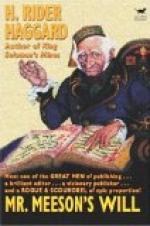“Oh, hang the etiquette of the profession!”
“My dear Meeson, if you came to me as a friend I should be happy to give you any legal information in my power, and I flatter myself that I know something of matters connected with probate. But you yourself said that you have come as a client, and in that case the personal relationship sinks into the background and is superseded by the official relationship. Under these circumstances it is evident that the etiquette of the profession intervenes, which overmastering force compels me to point out to you how improper and contrary to precedent it would be for me to listen to you without the presence of a properly qualified solicitor.”
“Oh, Lord!” gasped Eustace, “I had no idea that you were so particular; I thought perhaps that you would be glad of the job.”
“Certainly—certainly! In the present state of my practice,” as he glanced at the solitary brief, “I should be the last to wish to turn away work. Let me suggest that you should go and consult my brother John, in the Poultry. I believe business is rather slack with him just now, so I think it probable that you will find him disengaged. Indeed, I dare say that I may go so far as to make an appointment for him here—let us say in an hour’s time. Stop! I will consult my clerk! Dick!”
The infant appeared.
“I believe that I have no appointment for this morning?”
“No, Sir,” said Dick, with a twinkle in his eye. “One moment, Sir, I will consult the book,” and he vanished, to return presently with the information that Mr. Short’s time was not under any contributions that day.
“Very good,” said Mr. Short; “then make an entry of an appointment with Mr. John Short and Mr. Meeson, at two precisely.”
“Yes, Sir,” said Dick, departing to the unaccustomed task.
As soon as Eustace had departed from Tweedledum to Tweedledee, or, in other words, from James, barrister, to John, solicitor, Dick was again summoned and bade go to a certain Mr. Thomson on the next floor. Mr. Thomson had an excellent library, which had come to him by will. On the strength of this bequest, he had become a barrister-at-law, and the object of Dick’s visit was to request the loan of the eighth volume of the statutes revised, containing the Wills Act of 1 Vic., cap. 26, “Brown on Probate,” “Dixon on Probate,” and “Powles on Brown,” to the study of which valuable books Mr. James Short devoted himself earnestly whilst awaiting his client’s return.
Meanwhile, Eustace had made his way in a two-penny ’bus to one of those busy courts in the City where Mr. John Short practised as a solicitor. Mr. Short’s office was, Eustace discovered by referring to a notice board, on the seventh floor of one of the tallest houses he had ever seen. However, up he went with a stout heart, and after some five minutes of a struggle, that reminded him forcibly of climbing the ladders of a Cornish mine, he arrived at a little door right at the very top of the house on which was painted “Mr. John Short, solicitor.” Eustace knocked and the door was opened by a small boy, so like the small boy he had seen at Mr. James Short’s at the temple that he fairly started. Afterwards the mystery was explained. Like their masters, the two small boys were brothers.




